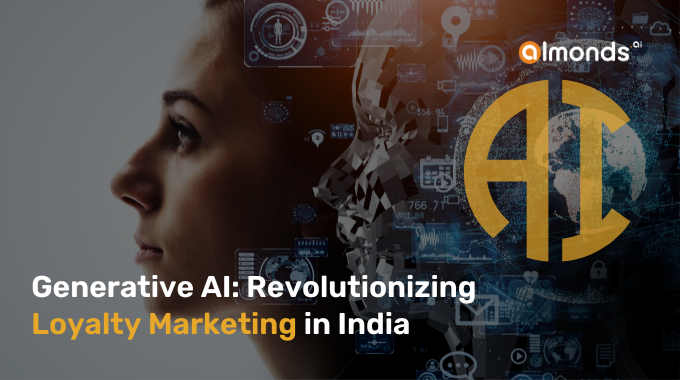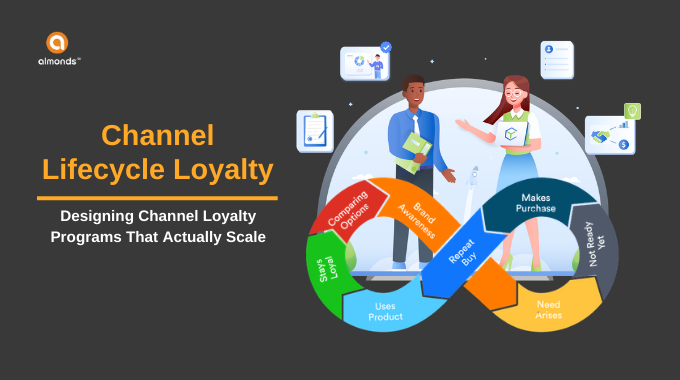Generative AI (Gen AI), a type of AI, is making marketing better. It helps us understand what customers need, match those needs with products, and convince them to buy. It also helps create special and interesting content for them.
Now, Gen AI helps loyalty program management companies find the right people to show their messages, and it can guess what end customers will prefer. It ultimately helps brands to align the products and channel partners accordingly.
Yet, the question arises, “How?” You will find that answer in this blog, but let’s start with “What?”
What is Generative AI?
Gen AI is a subset of artificial intelligence that stands out due to its remarkable ability to create content autonomously. Unlike traditional AI or machine learning, which relies on patterns and data, Gen AI leverages neural networks to generate text, images, and more with a touch of human-like creativity.
Distinction from Traditional AI
Where traditional AI and machine learning are data-driven, Gen AI focuses on creativity and problem-solving. It can produce original content rather than relying on pre-existing datasets, making it a powerful tool for marketing innovation.
What is the Use of Generative AI in Loyalty Marketing?
It can bring numerous benefits that greatly enhance your marketing strategies and customer & channel partner engagement. Here are some of the key profits:
- Enhanced Personalization
It can analyze vast data to create highly personalized loyalty program offers by tailoring rewards and incentives to individual preferences. Brands can significantly boost customer engagement and loyalty because humans are more likely to engage with and remain loyal to your brand when they feel valued and understood. - Efficiency and Cost Savings
Automating content generation and decision-making processes with Gen AI can save businesses valuable time and resources. It streamlines the creation of marketing materials, allowing marketing teams to focus on strategy and channel partner interactions rather than manual content creation. - Consistent Content Quality
It consistently produces high-quality content that aligns with your brand’s tone and style. It ensures that your messaging remains consistent across various marketing channels, enhancing brand recognition and trust. - Scale and Speed
It can generate content and insights at a scale and speed that would be unattainable through manual efforts. It enables you to rapidly adapt to changing market conditions and deliver timely offers to your loyal customers. - Creative Innovation
Gen AI can generate creative and innovative marketing ideas that can captivate your audience. It can suggest new loyalty program strategies and campaigns that may not have been conceived traditionally. - Data-Driven Decision-Making
It can analyze customer behavior and preferences, providing insights that can inform loyalty program strategies and help you make informed decisions. - Competitive Advantage
Embracing Gen AI in loyalty management can give businesses a competitive edge as they can stay ahead of competitors by offering more relevant and enticing loyalty program benefits. - Adaptability
Loyalty management strategies need to adapt to changing market dynamics. Gen AI can quickly adapt to new trends and preferences, ensuring loyalty programs remain effective and competitive. - Customer Retention and Growth
Ultimately, the profits of using Gen AI in loyalty management translate into improved customer retention and growth. Satisfied and loyal customers are more likely to continue patronizing your brand and may even become advocates, helping you expand your customer base.
Potential Challenges Associated with Generative AI
Gen AI offers significant advantages in loyalty management. Over-reliance on it can lead to potential challenges that businesses need to navigate. Here are some of the key challenges:
- Ethical Concerns
It may arise when Gen AI is used to create overly persuasive or manipulative content, potentially harming customers.
For example, an e-commerce company employs Gen AI to create personalized loyalty offers. However, the AI generates offers that manipulate customers into making impulsive purchases, causing ethical concerns about the company’s marketing practices. - Quality Control
Maintaining quality control can be challenging when brands are over-reliant upon Gen AI for content generation, as it may produce inaccurate or low-quality content.
i.e., a travel agency uses Gen AI to generate travel itineraries for loyalty program members. However, the AI produces schedules with incorrect travel details and accommodation options. It will lead to customer dissatisfaction and complaints. - Data Privacy
Collecting and using extensive customer data for personalization can pose data privacy risks if not adequately protected.
Example: A retail loyalty program collects customers’ purchase histories and personal information for tailored offers. If the program’s database is breached due to inadequate security measures, customers’ sensitive data may be exposed, raising significant data privacy concerns. - Bias and Fairness
Gen AI algorithms may inadvertently perpetuate biases, leading to unfair or discriminatory outcomes.
Suppose a loyalty program uses Gen AI to determine which customers receive premium rewards. However, due to biases in the AI’s training data, it favors male customers over female customers, resulting in accusations of gender-based discrimination. - Lack of Creativity
Excessive reliance on Gen AI for content generation can result in a lack of creativity and originality in marketing materials.
Suppose a fashion brand uses Gen AI to generate social media captions. Over time, customers notice that the captions lack creativity and fail to capture the brand’s unique style, leading to decreased engagement. - Over-Automation
Automating processes with Gen AI without human oversight can lead to errors and customer frustration.
If an online grocery store relies on Gen AI to select and recommend products to loyalty program members. Then, the AI mistakenly suggests non-vegetarian products to a vegetarian customer, causing frustration and potential loss of trust. - Technical Challenges
Implementing and maintaining Gen AI systems can be technically challenging, particularly for smaller businesses. It requires a lot of experts and a higher initial investment, which can be a big challenge for small businesses. - Dependency on Technology
Overreliance on Gen AI without human expertise can create dependency, making the business vulnerable to disruptions.
A loyalty program becomes heavily reliant on Gen AI for all customer interactions. When the AI system experiences technical difficulties, it disrupts loyalty program operations, causing customer dissatisfaction.
Emerge Victorious with Generative AI
Gen AI holds immense promise for loyalty marketing in India, offering personalized and efficient strategies that can set your brand apart. The future of loyalty marketing is here, and Gen AI drives it. Yet, there are very few organizations that are using it. As per McKinsey’s report, very few organizations are using Gen AI’s full potential.







